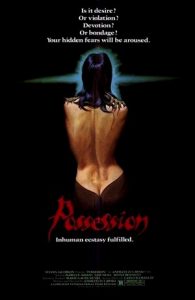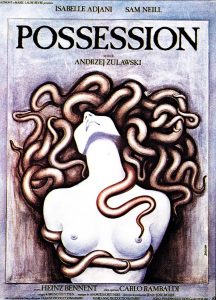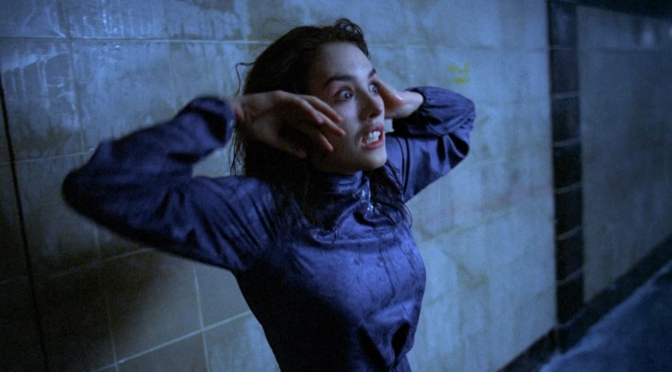The following post is a mildly edited and expanded reproduction of an introductory talk delivered by myself, Eddie Falvey, for Cert. X’s screening of Possession (Dir. Andrzej Zulawski, 1981). Created by several PhD researchers within the University of Exeter’s English Department, Cert. X aims to bring classic films back to the big screen, with a particular emphasis on cult horror. Hosted by the Exeter Phoenix, screenings have so far included Deep Red (Dir. Dario Argento, 1975), The Witch Who Came From the Sea (Dir. Matt Cimber, 1976), Possession, and The Hills Have Eyes (Dir. Wes Craven, 1977).
Andrzej Zulawski was born in Poland in 1940. As a filmmaker he never had the opportunity to enjoy the acclaim or exposure of contemporary compatriots such as Andrzej Wadja, Roman Polanski, or Krzysztof Kieslowski but has nevertheless attracted scholarly attention more recently. This neglect should not been seen as a reflection on the quality of his films but was, instead, a natural reaction to the obscure, avant-garde, or downright difficult nature of his films that were often too much for the palettes of mainstream moviegoers. Nevertheless, Zulawski has gained a cult appreciation among fans and critics, not least for Possession which is by far his most accessible (and arguably his most enduring) feature. A final contributing factor to Zulawski’s frequent exclusion from conversations regarding great Polish filmmakers comes down to the controversial temperament of his films; since his second feature The Devils was banned upon release by the then-communist Polish government, the director has struggled to unshackle himself from the controversy that continues to surround his filmography.
The reasonable exposure of Possession owes much to the matter of its notoriety, not to mention to the fact that it is an English language film which, unsurprisingly, contributes to its status. In the United Kingdom, the film belonged to a mostly mucky group of exploitation horrors known as the ‘video nasties’ of the 70s and 80s. Despite Possession’s association with the ‘nasties’ — a group of films either banned or cut here in the UK — Possession never actually feels like it belongs among them; no cuts were insisted upon by the BBFC (a matter that should automatically disqualify it from that list) and, although it was unavailable for some time, the heavily edited version that was that was released in the US came about due to the fact that US censors, not UK, objected to some of the more explicit material. Moreover, its awkward association with the slashers that typically make up the majority of the list is emboldened by the fact that most films on the list lack the clear sophistication of Zulawski’s nightmarish vision of marriage in collapse. As Michael Atkinson rightly points out the film was “roundly dismissed as a cranked-up, tongue-in-cheek horror exercise, [however] Possession becomes a different species of meateater once you realise […] that the man [Zulawski] is as serious as cancer” (‘Blunt Force Trauma’ 80).
Possession’s association with the ‘nasties’ was quickly leapt upon by its distributors who recognised the marketing capital of the notorious tag which situated it among sleazy, exploitation pictures such as Cannibal Holocaust, Zombie Flesh Eaters, and I Spit On Your Grave. Possession’s marketing campaign followed accordingly; the film’s original, theatrical poster (included below) conveys clear indebtedness to the patently misogynistic iconography of the ‘nasties’ which often indulged in images of objectified and/or victimised women. Isabelle Adjani adorns the poster, front and centre, in a provocative yet discomforting state of undress; for a film that depicts a woman on the brink of mental collapse, this particular image is unpleasant at best and downright offensive at worst. Accompanied by a tagline that reads “Your hidden fears will be aroused”, such imagery is complicit in the horror genre’s exploitative representation of mental health disorders (a matter that most ‘nasties’ post-Psycho utilised with merciless glee) and abusive, scopophilic stylisation of women’s bodies as sites of monstrosity and/or abuse. Furthermore, such marketing ploys convey a frankly reductive presentation of Zulawski’s complex psychodrama by diminishing it to a single, unrepresentative image. In another poster (also included) Adjani is locked in a fit of madness and/or desire with phallic tentacles binding her. The most tragic element of all this is the fact that the thing Adjani bears most of all is her soul in what can only be described as a thrilling, award-winning performance (Adjani was awarded Best Actress at Cannes following the film’s premiere). There is no question here as to whom the target demographic was at the time; the image of the possessed woman plays into the hands of the androcentric and sometimes misogynistic orientation of the entire genre. It is an image that frequently adorns the marketing campaigns for notorious films — famously with the likes of The Exorcist and Carrie, but more insidiously with the likes of I Spit on Your Grave, a particularly appalling rape revenge film that occasionally rears its ugly head in critical discussions. Such representations do not present women as flesh-and-blood individuals but rather as objects of male desire serving some ludicrous patriarchal (wet) dream that enables aggressive masculine sexual subjectivities while reducing women to little more than their bodies. Such marketing packages the worst offenders as expressive of a terrifying embodiment of patriarchal power that is both violent and overtly sexualised, promising films that hang on their money shots and not on their substance.


Figures 1 and 2: Left, the original poster for Possession bearing the tagline “Your hidden fears will be aroused”. Right, a more recent poster for the film.
All this aside, anyone who has seen Possession will tell you that the film only just about qualifies as a genuine horror. Despite the more traditionally “horrific” second act, Possession is primarily a film about a marriage in ruin — imagine, if you will, Bergman’s Scenes from a Marriage crossed with the surrealism of David Lynch and, finally, complimented by a modest sprinkling of Hitchcock and you are some of the way there. Moreover, it is worth noting that Possession was filmed in Berlin by an ostracised Polish filmmaker using American money and an international cast; everything about this film, from narrative, locations, score, and hyper-kinetic camerawork, screams dislocation and displacement. In fact, one may go further and consider Possession in light of that fact that it was made during the breakdown of Zulawski’s own marriage at which point the film assumes new, fascinating dynamics. Possession is a bitter film, no doubt, but it is also an unrelentingly sad one. While some may feel affronted by the misogynistic tendencies of Sam Neil’s character — who may or may not be functioning as an autobiographical device conveying Zulawski himself — if one makes use of that old-world misogyny as a window through which we may explore the breakdown of this particular marriage, then the source of Anna’s madness/despair/alienation comes into view. As Michael Goddard points out, the “evil [in Possession] is not something abstract, but something that has been produced between Anna and Marc, signifying the darkness that has come to contaminate their relationship” (‘Beyond Polish Moral Realism: The Subversive Cinema of Andrzej Żuławski’ 246). Some might find the sex and violence brutal and affecting, but Marc and Anna quickly unveil the destructive powers of possession in its many forms. Viewing the film for the first time often amounts to a chilling, incapacitating experience; it is much like peering into fragments of a broken mirror in which the doomed couple expose the masochistic treachery of mistaking power, possession, and sex for love.
Eddie Falvey is an AHRC-funded PhD candidate in film. While his interests are diverse, his current research is focused on early American film for which he is completing a thesis titled ‘The Birth of a Cinematic City: From an Iconographical to an Iconological Reading of New York on Early Film’.








